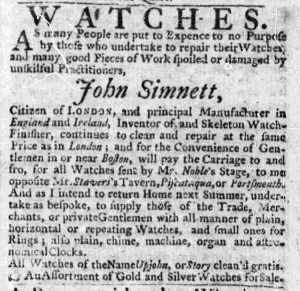GUEST CURATOR: Zachary Dubreuil
What was advertised in a colonial American newspaper 250 years ago this week?

“WATCHES PROPERLY AND EXPEDITIOUSLY REPAIR’D.”
This advertisement stood out to me because John Simnet sold watches and also provided a service related to watches. He “PROPERLY AND EXPEDITIOUSLY REPAIR’D” watches. Pocket watches were intricate and watchmakers were the only people that could fix them. Simnet promoted himself as a skilled artisan in this advertisement, making it known that he would be able to fix watches correctly and quickly. According to the National Association of Watch and Clock Collectors, “Most colonists with watchmaking skills sold and repaired imported watches instead of making them.” Simnet’s advertisement seems to demonstrate that trend. He emphasized repairing watches at the beginning and did not mention “Gold and Silver Watches for Sale” until the end. He may have made those watches during the time he lived in London and Dublin and brought them across the Atlantic to Portsmouth, New Hampshire. The National Association of Watch and Clock Collectors also states that advertisements “show that a small number of watches were made in America” in the mid 1770s.
**********
ADDITIONAL COMMENTARY: Carl Robert Keyes
To drum up business when he arrived in New England, John Simnet placed a series of advertisements in colonial newspapers. This notice from the March 17, 1769, edition of the New-Hampshire Gazette was a variation on others that he had previously inserted in the same newspaper, though it scaled back on some of the appeals to price, quality, and experience in the earlier advertisements.

All of Simnet’s advertisements in the New-Hampshire Gazette, however, were rather restrained compared to the much lengthier advertisement that he inserted in the February 16, 1769, edition of the Boston Weekly News-Letter. In that notice he expended far more prose to convince prospective clients of his skills as a watchmaker. He lamented that “many People are put to Expence to no Purpose by those who undertake to repair their Watches,” suggested that some artisans who claimed to be skilled watchmakers charged fees for their efforts but did not produce results. Others, he proclaimed, caused further injury as a result of their attentions, leaving “many good Pieces of Work spoiled or damaged by unskilful Practitioners.” Such was not the case with Simnet! To demonstrate that prospective clients could entrust their watches to him, he provided his credentials: “Citizen of LONDON, and principal Manufacturer in England and Ireland, Inventor of and Skeleton Watch-Finisher.” He had acquired and refined his skills throughout his long experience as a watchmaker on the other side of the Atlantic. He made only a nod in that direction in his shorter advertisements in the New-Hampshire Gazette, noting in one that he had been “Twenty-Five Years Watch-maker in London” and in another describing himself as “Watch-Finisher, and Manufacturer of London and Dublin,” but not indicating his years of experience.
In his lengthier advertisement in the Boston Weekly News-Letter, Simnet also emphasized customer service to a greater degree. Attempting to enlarge his market beyond Portsmouth, New Hampshire, he addressed “Gentlemen in or near Boston.” Realizing that most would not travel to the neighboring colony just to have their watches cleaned or repaired, he offered them the “Convenience” of paying for “the Carriage to and fro, for all Watches sent by Mr. Noble’s Stage” to his shop “opposite Mr. Stavers’s Tavern.” This was an eighteenth-century version of mail order service. A savvy entrepreneur, Simnet absorbed the costs of shipping to make his services more attractive to faraway clients. He also offered a premium to colonists who owned watches made by certain manufacturers: “All Watches of the name Upjohn, or Story clean’d gratis.” Simnet did not specify his connection to those watchmakers, but that probably mattered little to prospective clients interested in this free service. For Simnet, it may have been merely a way to initiate or cement relationships with clients.
Why were Simnet’s advertisements in the New-Hampshire Gazette truncated compared to the one in the Boston Weekly News-Letter? Perhaps the watchmaker felt that he faced less competition in Portsmouth but needed to distinguish himself if he hoped to enlarge his market to include Boston and its environs. He advanced a variety of appeals in each advertisement, but some of them better demonstrated the marketing innovations he was capable of devising.
